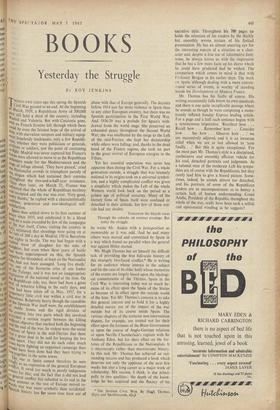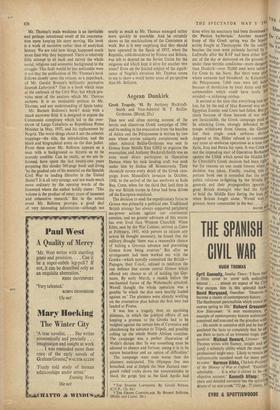BOOKS
Yesterday the Struggle
Y ROY JENKINS TwENTry-Two years ago this spring the Spanish , Civil War ground to an end. At the beginning °` March, 1939, a Republican Army of 500,000 ;len still held a third of the country, including \l add and Valencia. But with Catalonia gone, pith no French frontier left through which there call.d be even the faintest hope of the arrival of help, with starvation rampant and military equip- 'Not hopelessly inadequate, only a few Republi- cll,s, whether they were politicians or generals, Civilians or soldiers, saw the point of continuing f'e„ tight. Madrid was never captured but Franco's dlees were allowed to move in as the Republican "het-enders made for the Mediterranean and the hope of refuge abroad. 'They have passed,' cried the Nationalist crowds in triumphant parody of ih slogan which had sustained their enemies t°oghout the . I hr
e ;'formed days later,two-a nd-
on Marcha-half-year 31, Francoresistance was 'Oa :'"ormed that the whole of Republican territory via :% aS occupied and the war was over. 'Very good, d 3 1144 thanks,' he replied Anon a characteristically f3Cd Catt iOUS, pedestrian and -ideological self- t
,.dry satisfaction.
Aini ,SIgain then settled down to its first summer of ,,r), aee since 1935, and celebrated it by a blood —iie ,;th on a scale exceeded by few of the campaigns true P',Ibe war itself. Ciano, visiting the country in et': „tilY, estimated that shootings were going on at .3. d"rte rate of 200 a day in Madrid, 150 in Barcelona 4,,n. d eighty in Seville. The war had begun with a afile silelent wave of slaughter for the sake of new h4ughter, but even when three years of battle but .,`Itt been superimposed on this, the Spanish Dieu s-in,Petile for bloodshed, at least on the Nationalist ,Ter \ ‘le, had not been assuaged. 'Long live death,' ll'of °f the one of the favourite cries of one leader t°„. ,, the Falange, and it was not an inappropriate 1th"; ti;Dression of the national mood at the time. On he e,Republican side, too, there had been a great -11 a sisal of senseless killing in the early days, and f itg ;Ile had been taken off in May, 1937, for a to e ,J time
little civil war within a civil war in re 01 o'farcelona. Relatively heavy though the casualties
• $ b, the Spanish War itself were, the establishment Inttliiiii the stable fronts and the rigid division of country into two parts which this involved triess hro • ". i ,, Vided a certain respite between the killing it di, I "'tbout objective that marked both the beginning coc.11'° tensions the end of the war. So violent were the social :„Itil waill_sktos of Spain in the mid-Thirties that there Ln sidLa great deal to be said for keeping the two wt i 4107 apart. They did not do each other much rad? Iv_ e harm fighting an organised campaign than r•ecid ii,"uld have been done had they been trying to to 7, together in the same towns. r3 /0 ,.iiii he war in Spain cannot therefore be seen 410 ,„11)Y as an expression of the general European OW, . stunflict. It owed too much to purely indigenous g the, ,oases for this; and the fact that it did not lead cideg,-;`) general conflict but subsided to its end in the toi a a iv112e summer as the rest of Europe moved to- ig Spas War was more symbolic than accidental. olish history has for some time been out of
phase with that of Europe generally. The decades before 1914 saw far more violence in Spain than in any other European country, but there was no Spanish participation in the First World War. And 1936-39 was a prelude for Spain's with- drawal from the world stage. She preserved an exhausted peace throughout the Second World War; she was unaffected by the surge to the Left of the mid-Forties; she kept her dictatorship while others were falling; and, thanks to the dead hand of the Franco regime, she took no part in the great revival of European energies in the Fifties.
Yet her essential separation was never less apparent than during the Civil War. For a whole generation outside, a struggle that was intensely national in its origins took on a universal symbol- ism, and a highly complicated conflict was given a simplicity which makes the Left of the whole Western world look back on the period as a golden age of political certainty. Many of the literary lions of Spain itself were confused or detached in their attitude, but few of those out- side had any doubts.
Tomorrow the bicycle races Through the suburbs on summer evenings. But today the struggle.
So wrote Mr. Auden with a juxtaposition as memorable as it was odd. And he and many others were moved and committed by Spain in a way which found no parallel when the general war against Hitler started.
Mr. Hugh Thomas has set himself the difficult task of providing the first full-scale history of this strangely two-faced conflict.* He is writing for an audience whose interest in the subject and (in the case of its older half) whose memories of the events are largely based upon the ideologi- cal commitments of the Thirties. Spain in the Civil War is interesting today not so much be- cause of its effect upon the Spain of the Sixties as because of its effect upon the outside world of the time. Yet Mr. Thomas's concern is to take this general interest and to hold it for a highly detailed survey not of the impact of the war outside but of its course inside Spain. The various chapters of the tortuous non-intervention dispute, for example, are treated not for their effect upon the fortunes of the Blum Government 01 upon the course of Anglo-German relations
or upon Neville Chamberlain's rupture with Sir Anthony Eden, but for their effect on the for- tunes of the Republicans or the Nationalists. It is microscopic rather than macroscopic history. In this task Mr. Thomas has achieved an out- standing success and has produced a book which deserves not only the applause of the next few weeks but also a long career as a major work of scholarship. His success, I think, is due princi- pally to two qualities: the depth of the know- ledge he has acquired and the fluency of his
* THE SPANISH CIVIL WAR. By Hugh Thomas. (Eyre and Spottiswoode, 42s.) narrative style. Throughout his 700 pages be holds the attention of his readers by the thickly but smoothly woven texture of his factual presentation. He has an almost unerring eye for the interesting aspects of a situation or a char- acter and, despite a free use of informative foot- notes, he always leaves us with- the impression that he has a few more facts up his sleeve which he could have produced had he wished. The comparison which comes to mind is that with
l'rofessor Brogan in his earlier days. The work en Spain, although dealing with a more concen- trated series of events, is worthy of standing
beside his Development of Modern France.
Mr. Thomas has his faults of course. His writing occasionally falls below its own standards and there is one quite inexplicable passage where he sounds as though he were composing a mons- trously inflated Sunday Express leading article. For a page and a half each sentence begins with a synonymous imperative. 'Recollect how . . . Recall how . . . Remember how . . . Consider how . . See how . . Observe how . . .' we are successively adjured, and it is an immense relief when we are at last allowed to 'note finally....' But this is quite exceptional. For the most part Mr. Thomas's style is a disciplined, unobtrusive and smoothly efficient vehicle for his cool, detached portraits and judgments. As a rational man of the moderate Left his sympa- thies are of course with the Republicans, but they rarely lead him to give a biased picture. Some- times, indeed, he sounds almost too detached, and his portraits of some of the Republican leaders are so uncompassionate as to betray a certain lack of human understanding. Could Azafia, President of the Republic throughout the whole of the war, really have been such a selfish and opinionated windbag as he suggests?
Mr. Thomas's main weakness is an inevitable and perhaps intentional result of his concentra- tion upon keeping his story moving. His book is a work of narrative rather than of analytical history. We are told how things happened much more than why they happened. There is relatively little attempt to sit back and survey the whole social, religious and economic background to the struggle. This fault would be less noticeable were it not that the publication of Mr. Thomas's book follows closely upon the reissue, as a paperback, of Mr. Gerald Brenan's brilliantly perceptive Spanish Labyrinth.* This is a book which stops at the outbreak of the Civil War, but which pro- vides most of the analysis which Mr. Thomas eschews. It is an invaluable preface to Mr. Thomas, and any understanding of Spain today.
Mr. Burnett Bolloten's bookt deals with a much narrower field. It is designed to expose the Communist conspiracy which led to the over- throw of Largo Caballero as Republican Prime Minister in May, 1937, and his replacement by Negrin. The worst things about it are the exterior trappings—the title, the introduction, and the blurb and biographical notes on the dust jacket. From these notes Mr. Bolloten appears as a man with a background so bizarre as to be scarcely credible. Can he really, as we are in- formed, have spent the last twenty-two years preparing this slender 300-page book and living 'by the gradual sale of his material on the Spanish Civil War to leading libraries in the United States'? It is all very strange, and not made much more ordinary by the opening words of the foreword where the author boldly states: 'This volume is the product of many years of incessant and exhaustive research.' But in the actual event Mr. Bolloten provides a good deal of very interesting information—although not
nearly as much as Mr. Thomas managed rather more quickly to assemble. And he certainly shows us the machinations of the Comintern at work. But is it very surprising that they should have operated in the Spain of 1937, when the Republic, cold-shouldered by France and Britain, was left to depend on the Soviet Union for the exiguous aid which kept it alive for another two years? Even on the limited subject of the signifi- cance of Negrin's elevation Mr. Thomas seems to me to show a much better sense of perspective than Mr. Bolloten.







































 Previous page
Previous page